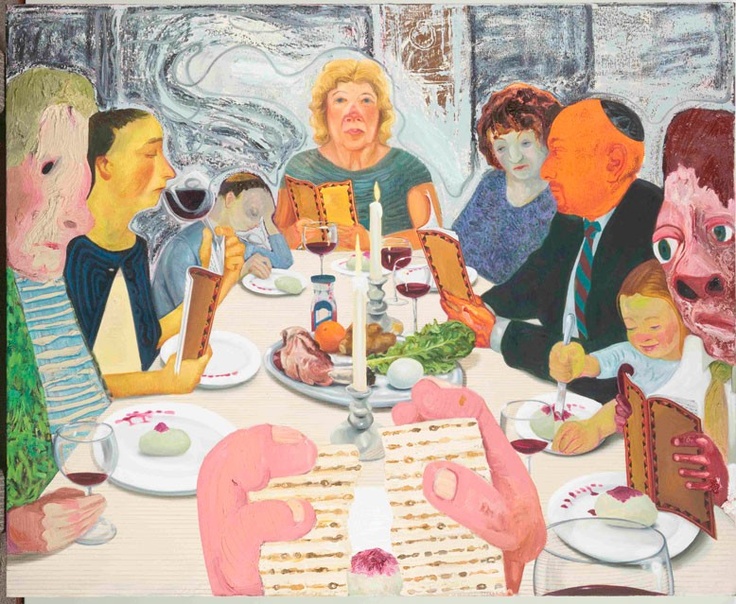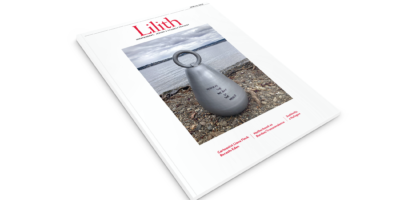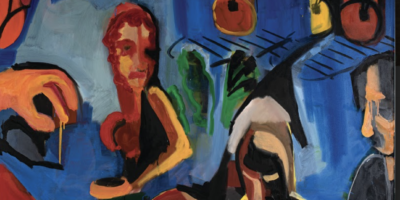
A New Feminist Haggadah
By me, Jewish patriarchal prayer is obsolete, even criminal, so the nagging feminist question remains: How can we throw out the bathwater but keep the baby? (though, honestly, I vote for throwing out the baby—in this case Moses—and jimmying up the bathwater).
Marcia Falk’s Haggadah brings us conservative, life-saving steps in the right direction: She retains some of the original patriarchal conceits, jettisons others, and, most effectively, makes the Haggadah personal and very accessible to those with little formal Jewish background. It is also a physically gorgeous book, spare and breathing on the page, and illustrated with Falk’s own balletic drawings of spring flora.
Her annotated retelling of the first 15 chapters of the Book of Exodus in itself makes Night of Beginnings worth buying. Falk remediates the perennial problem of the traditional Haggadah—that it weirdly doesn’t actually tell the biblical story of Hebrew enslavement and liberation—and she gives us all we need in order to conduct our own terrific seders, helping us both remember the originary telling, and also instilling it with freshness, April’itude, and relevance. (If you are not a poet, and/or not fluent in Hebrew, yes, some—but not all—of Falk’s Haggadah is not for you.)
Falk’s spare nods to historical truths are welcome, as in this example: “Ancient
Israelites brought sheaves of the new grain, unprocessed and unleavened, to
the Temple as the first offering of the agricultural cycle. This ritual predates the mythological association of matzah with the Exodus from Egypt.”
And her additions to the Haggadah can be so spot-on that one wonders why she is the first to make the connection. For example, Falk’s Haggadah includes Emma Lazarus’s “The New Colossus,” and also gives us this incisive introduction:
“Lazarus joins together concern for the exiled and homeless with the yearning for freedom—twin themes of the Exodus story. And, strikingly, the contrast she draws between the ‘brazen giant of Greek fame’ and the ‘Mother of Exiles’ echoes the contrast between Pharaoh and the women of the Exodus story, as will be made vividly apparent when we read ‘Maggid: The Telling.’”
In synch with our times, Falk does a lot of “not Othering.” She writes, “We take up the rabbis’ injunction that we place ourselves inside the story, reading it as though each of us was personally liberated from slavery….”
We might, Falk writes, look “inside ourselves for Pharaoh, who controls and dominates; Moshe, who seeks confidence and calling; Miriam and the other women, who embody empathy, compassion, and connection.” This “may reveal to us parts of ourselves that we are unaware of or that we do not always wish to acknowledge—the hidden pieces of our lives, the afikomans that need to be uncovered in order for us to be whole and truly free.”
Similarly, she writes, “Four children dwell within us: The child who wants to know; the child who feels apart and alone; the simple child; and the child who cannot ask.” Falk’s not so “simple child” uses “they” pronouns, about whom Falk explains, “This is the child who moves us on; this is the one who will change the world.” This radical empathy brought me to tears; this is Passover.
On the ritual of breaking the matzah, Falk offers a pensée called “Brokenness
and Wholeness.” “The human condition is brokenness,” she writes. And, she adds, “What is wholeness of self ? The pursuit of wholeness is the human calling.”
Her blessing over wine is also pitch-perfect: “On this Festival of Freedom, we cross/ from wilderness to promise/ from exile to home,/ from enslavement to fully lived lives./ We hallow this day and bless/the ever-flowing wellspring,/ which sustains us on the way,/ nourishing the fruit of the vines.”
Falk is the writer here; I am only the reviewer. So let me end with her words, a kavanah on the “fruit of the vine”:
The vine is tenacious, growing toward light without knowing what darkness may lie beyond. As it makes its way, it grows stronger, intertwining with other vines. In time, it will fruit; and the fruit will ripen and be sweet. And so with us: as we set out on our individual paths, often unaware of our ultimate destinations, we find strength in the intersection of our lives with the lives and destinies of others. Community arises, sustaining and nourishing, as we seek to find our way.
The fruit of the vine is life, lived to its fullest potential.
The fruit of the vine is a life of freedom, meaning, and fulfillment.
Amen.
Susan Schnur, serially a rabbi, writer, and clinical psychologist, lives in Brook-
line, MA.




